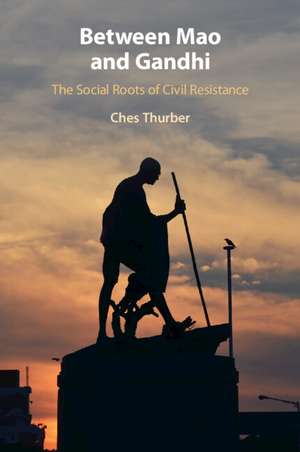Between Mao and Gandhi: The Social Roots of Civil Resistance: Cambridge Studies in Contentious Politics
Autor Ches Thurberen Limba Engleză Paperback – 18 oct 2023
| Toate formatele și edițiile | Preț | Express |
|---|---|---|
| Paperback (1) | 199.90 lei 6-8 săpt. | |
| Cambridge University Press – 18 oct 2023 | 199.90 lei 6-8 săpt. | |
| Hardback (1) | 583.36 lei 6-8 săpt. | |
| Cambridge University Press – 29 sep 2021 | 583.36 lei 6-8 săpt. |
Din seria Cambridge Studies in Contentious Politics
-
 Preț: 251.27 lei
Preț: 251.27 lei -
 Preț: 220.86 lei
Preț: 220.86 lei -
 Preț: 203.50 lei
Preț: 203.50 lei -
 Preț: 238.15 lei
Preț: 238.15 lei - 9%
 Preț: 626.76 lei
Preț: 626.76 lei -
 Preț: 162.90 lei
Preț: 162.90 lei -
 Preț: 210.37 lei
Preț: 210.37 lei -
 Preț: 160.00 lei
Preț: 160.00 lei -
 Preț: 178.72 lei
Preț: 178.72 lei -
 Preț: 289.11 lei
Preț: 289.11 lei -
 Preț: 197.42 lei
Preț: 197.42 lei -
 Preț: 231.38 lei
Preț: 231.38 lei -
 Preț: 263.79 lei
Preț: 263.79 lei -
 Preț: 274.27 lei
Preț: 274.27 lei -
 Preț: 227.61 lei
Preț: 227.61 lei - 11%
 Preț: 637.54 lei
Preț: 637.54 lei -
 Preț: 474.87 lei
Preț: 474.87 lei -
 Preț: 225.50 lei
Preț: 225.50 lei -
 Preț: 269.58 lei
Preț: 269.58 lei -
 Preț: 201.59 lei
Preț: 201.59 lei -
 Preț: 229.56 lei
Preț: 229.56 lei -
 Preț: 238.13 lei
Preț: 238.13 lei -
 Preț: 306.73 lei
Preț: 306.73 lei - 11%
 Preț: 553.62 lei
Preț: 553.62 lei - 11%
 Preț: 694.04 lei
Preț: 694.04 lei -
 Preț: 231.05 lei
Preț: 231.05 lei -
 Preț: 305.33 lei
Preț: 305.33 lei -
 Preț: 201.59 lei
Preț: 201.59 lei -
 Preț: 230.51 lei
Preț: 230.51 lei - 14%
 Preț: 791.97 lei
Preț: 791.97 lei - 11%
 Preț: 555.03 lei
Preț: 555.03 lei -
 Preț: 251.27 lei
Preț: 251.27 lei -
 Preț: 251.27 lei
Preț: 251.27 lei - 11%
 Preț: 459.73 lei
Preț: 459.73 lei -
 Preț: 267.08 lei
Preț: 267.08 lei
Preț: 199.90 lei
Nou
Puncte Express: 300
Preț estimativ în valută:
38.26€ • 41.58$ • 32.16£
38.26€ • 41.58$ • 32.16£
Carte tipărită la comandă
Livrare economică 21 aprilie-05 mai
Preluare comenzi: 021 569.72.76
Specificații
ISBN-13: 9781108927840
ISBN-10: 110892784X
Pagini: 281
Ilustrații: 15 b/w illus. 10 tables
Dimensiuni: 229 x 153 x 17 mm
Greutate: 0.38 kg
Editura: Cambridge University Press
Colecția Cambridge University Press
Seria Cambridge Studies in Contentious Politics
Locul publicării:Cambridge, United Kingdom
ISBN-10: 110892784X
Pagini: 281
Ilustrații: 15 b/w illus. 10 tables
Dimensiuni: 229 x 153 x 17 mm
Greutate: 0.38 kg
Editura: Cambridge University Press
Colecția Cambridge University Press
Seria Cambridge Studies in Contentious Politics
Locul publicării:Cambridge, United Kingdom
Cuprins
1. Pathways to revolution; 2. Social ties and civil resistance; 3. Nepal's Gandhians take arms; 4. Nepal's Maoists take to the streets; 5. Syria in the Arab spring; 6. Resisting colonial rule in the Syrian mandate; 7. Barriers to civil resistance: a global analysis; 8. Gandhi revisited: overcoming barriers to civil resistance in South Africa and India; 9. Conclusion; Appendix: notes on field research in Nepal; References; Index.
Recenzii
'In this book, Ches Thurber explores why movements challenging state power adopt violent or nonviolent strategies of resistance. Thurber argues this variation can be traced back to the structure of social networks and connections within which these movements are embedded and provides extensive supporting evidence from Nepal, Syria, and cross-national data. This is a first-rate contribution to answering a fundamentally important question.' Paul Staniland, Associate Professor of Political Science, The University of Chicago
'In Between Gandhi and Mao, Thurber takes on a critical question: if nonviolent resistance is more effective, why do many groups still choose armed warfare? Through careful analysis of revolutionary struggles in Nepal and Syria he reveals that movements can only successfully implement nonviolent strategies when there are sufficient social ties among various sectors of the population and the regime. Thurber's book is theoretically sophisticated, empirically rich, beautifully written, and sheds important light on revolutionaries' strategic decision-making processes. It marks an important advance by bridging the study of civil war and civil resistance.' Sharon Erickson Nepstad, Chair and Distinguished Professor of Sociology, University of New Mexico, and author of Nonviolent Struggle: Theories, Strategies, and Dynamics
'In Between Gandhi and Mao, Thurber takes on a critical question: if nonviolent resistance is more effective, why do many groups still choose armed warfare? Through careful analysis of revolutionary struggles in Nepal and Syria he reveals that movements can only successfully implement nonviolent strategies when there are sufficient social ties among various sectors of the population and the regime. Thurber's book is theoretically sophisticated, empirically rich, beautifully written, and sheds important light on revolutionaries' strategic decision-making processes. It marks an important advance by bridging the study of civil war and civil resistance.' Sharon Erickson Nepstad, Chair and Distinguished Professor of Sociology, University of New Mexico, and author of Nonviolent Struggle: Theories, Strategies, and Dynamics
Notă biografică
Descriere
Asks why some dissident movements adopt nonviolent strategies of resistance, while others choose to take up arms.
